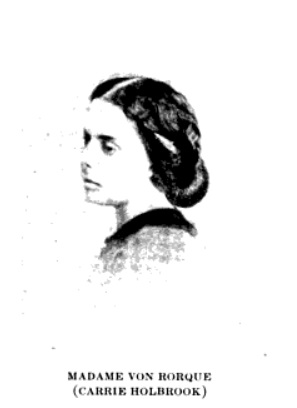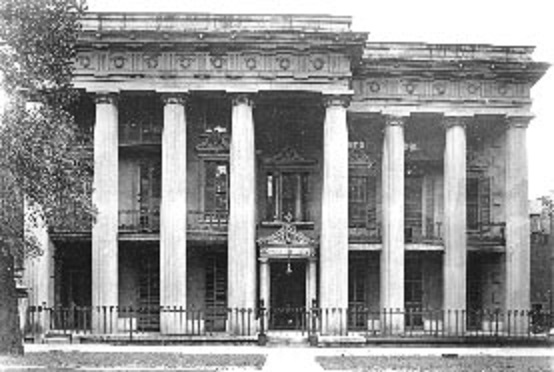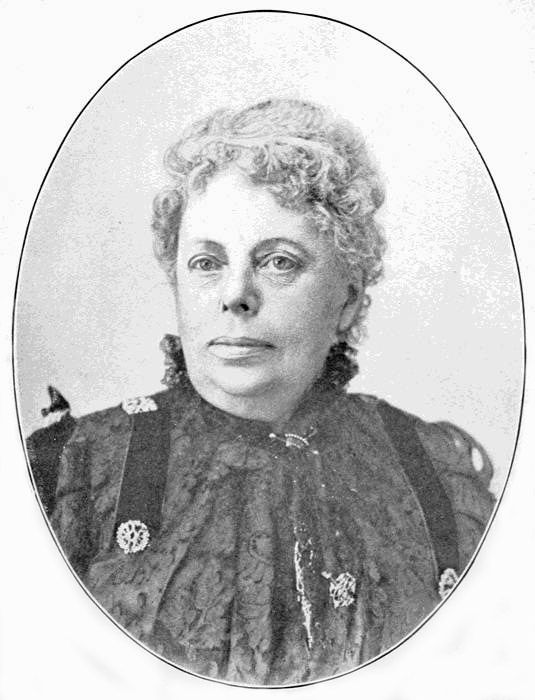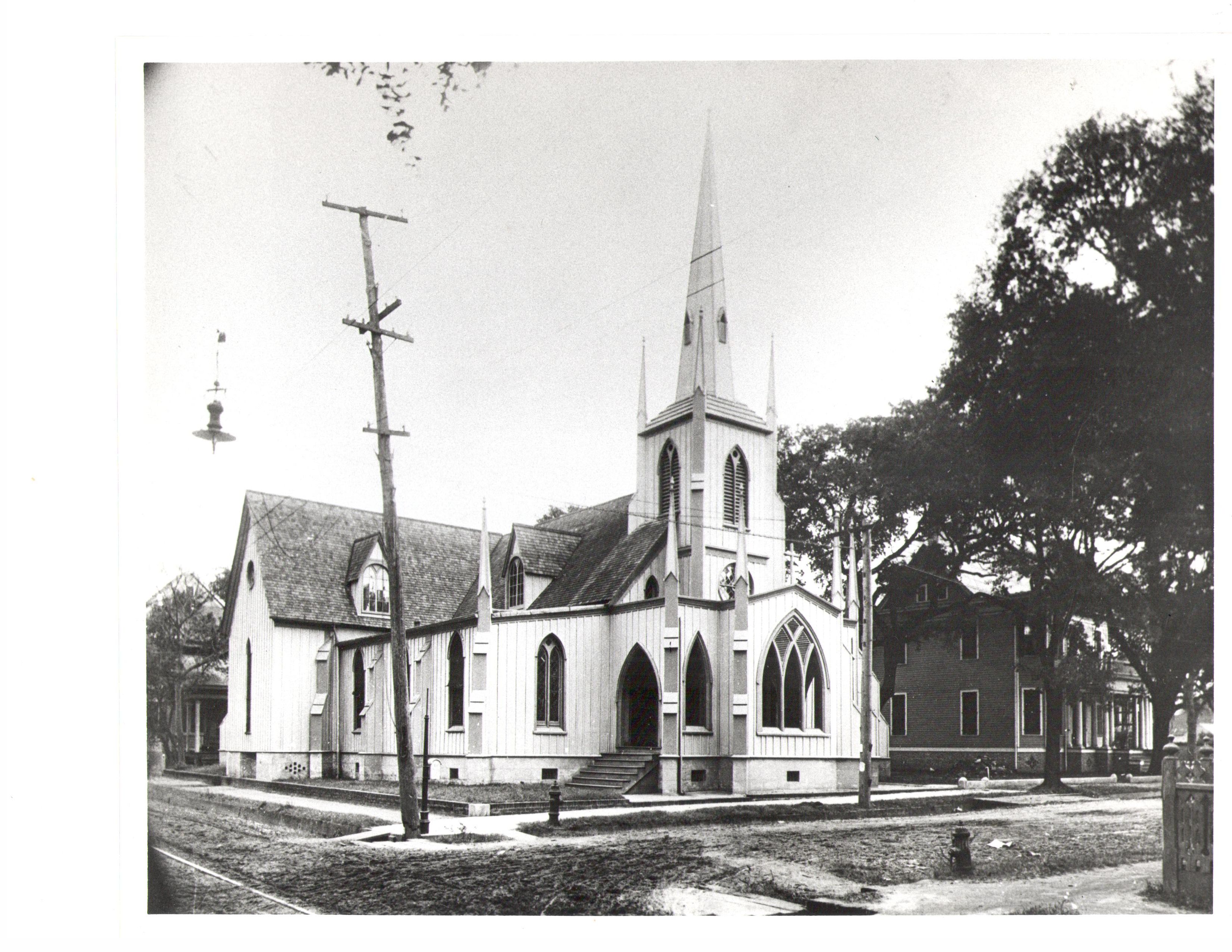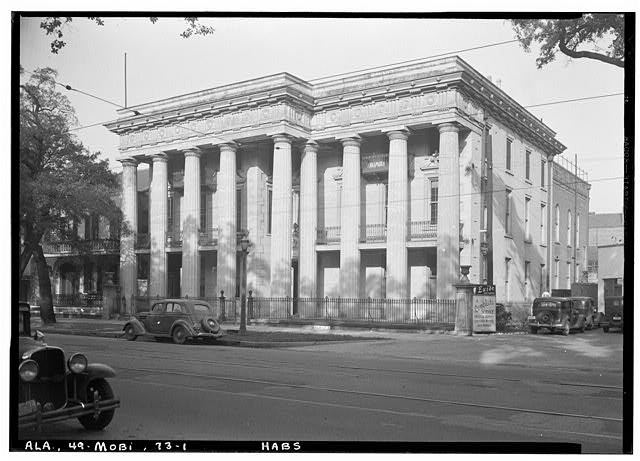Daughter of Darius Blake Holbrook.
Cousin of Mrs. Cornelius Vanderbilt (Frank Crawford Vanderbilt).
First married (1857) to William G. Chandler (d.1862)
Second marriage (1863) to Capt. Franklin Bache du Barry (d.1864)
Third marriage (1866) to Charles Rebello
Fourth marriage (1872) to Baron Adolph von Roques.
"Buried near her son in Paris."
Caroline Holbrook met William G. Chandler when she went to Mobile, Alabama in 1856 to visit her uncle, the Rev. Joseph H. Ingraham (1809-1860), rector of St. John's Episcopal Church. Rev. Ingraham was a 19th century novelist, his most popular titles including The Prince of the House of David (1855), said to have influenced Ben Hur (1880), and The Pillar of Fire (1859) on which Cecil B. DeMille's film "The Ten Commandments" (1923) was based (remade 1956).
Boston (Mass.) AMERICAN TRAVELLER, 24 October 1857, page 4:
“Marriages.
…In New York, Oct. 12, Wm G. Chandler, of the house of St. Johns, Powers & Co., Mobile, and Caroline E. Holbrook, daughter of D.B. Holbrook, of New York.”
"They fell in love and married in 1858 (sic). They had two children, Holbrook St. John Chandler and Florence. However, William Chandler died suddenly in 1862 at the age of 32." His sudden death caused some Mobilians to suspect foul play, particularly the Chandler family according to published reports later. There being little evidence to support suspicions of poison, these were considered to be the prejudices of a Southern community toward a Yankee interloper just two years into the American Civil War. The will of William G. Chandler written in 1860 advised that his wife go North to live but requested that his son be raised by his mother in Mobile.
The will of William G. Chandler was signed on Aug. 8, 1860, and witnessed by Mobile attorneys Waller Thompson and Enoch Fulford Hellen. Both witnesses were members of Christ Church (Episcopal) in Mobile, but Waller Thompson converted to Catholicism. William G. Chandler died July 3, 1862.
In 1855, William Chandler had a pew at Government Street Presbyterian Church. His father was one of the first two deacons selected in 1840 and also a presiding elder in the 1840s-50s (The Archives Tell A Story: History of Government Street Presbyterian Church [1968]). Infant baptism records for William G. Chandler's two children have not been located either at Government Street Presbyterian Church nor Christ Episcopal Church. (Church Register, Government Street Presbyterian Church, 1831-1901; Session Minutes, 1831-1881.)
"His death in 1863 was from inflammation of the brain caused by extreme tension and anxiety, attendant upon the heavy financial responsibilities of his firm in the midst of the civil war. A year and a half afterwards she became attached to the hospitals in Charleston during the bombardment, and married Franklin du Barry, after he sustained in action a mortal wound. He was taken by her and his brother on board the FANNY, a blockade runner, which was chased by the U.S. Gunboats from Wilmington to Nassau, and on the way he died, and was buried at sea. Eight years after this in 1873, when the war was at an end, she married the Baron von Roques who is still living."(Liverpool ECHO, June 19, 1889.)
Capt. Franklin Bache du Barry was a son of Dr. Edmund L. DuBarry (1797-1853) and Emma Duane DuBarry. Dr. DuBarry was a friend and personal physician to Napoleon's brother Joseph Bonaparte, former king of Spain. His grandfather was a nephew of the famous Madame DuBarry, mistress of King Louix XV. Emma DuBarry's parents were Col. William Duane (1760-85) and Margaret Hartman Markoe Bache, widow of Benjamin Franklin Bache, the grandson of Benjamin Franklin.
Another reference says Capt. Du Barry married Caroline Holbrook Chandler in Macon, Georgia, and she went to visit relatives in Grenada, Mississippi. Carrie's uncle, the Episcopal rector, had moved to Holly Springs, Miss., from Mobile, and died at Holly Springs in 1860. "Later Capt. Du Barry took a six-month leave of absence from Confederate service for health reasons (said to be tuberculosis) and sailed with his wife for the Bahamas in May 1864 but died on the second day of the voyage and was buried at sea."
Etched in Arsonic by Trevor Christie, page 30, says: "After the close of the war, (Mrs. du Barry) drifted back to New York, and in the late 1860s was a frequent companion of the second Mrs. Cornelius Vanderbilt, her cousin...."
MURDEROUS WOMEN: TRUE TALES OF WOMEN WHO KILLED," by Frank Jones, says pretty much the same thing.
Mrs. Cornelius Vanderbilt was the former Miss Frank Armstrong Crawford of Mobile, the daughter of Robert Leighton Crawford and Martha Everitt Crawford. Commodore Vanderbilt's grandson later married Miss Alvah Smith, also of Mobile.
Mobile, founded in 1702, was the original capital of what was then French Louisiana. "A 19th-century winter retreat for the rich and famous, it was the winter vacation home for many wealthy New England families, and members of the Vanderbilt, Rockefeller, and Astor families all had mansions on Mobile's famed Government Street" in the generations before Alva Vanderbilt from Mobile built Marble House and Belcourt Castle at Newport, R.I., the construction of which began the building competition that created the Newport we know today.
Oct. 16, 1866: Caroline Holbrook Chandler Du Barry reportedly married in Newark, Essex County, New Jersey to Charles Rebello, described in some newspapers as an Italian Count. A few articles call him Carlos and say he came from Cuba where he claimed to have vast sugar plantations. They may be the same or he may be confused with the Charles Rebello who was the British Vice Consul at Cardenas (Augusta, Georgia DAILY CONSTITUTIONALIST, Dec. 6, 1860, p.3). In 1861, Charles Rebello, British Vice-consul, published a study of sugar estates in Cuba (The American Agriculturist, January 1861, p.6). In Dec. 1866, he was associated with the Virginia City and Gold Hill Water Company, incorporated in New York (NY Evening Post, Dec. 21, 1866, p.4). He is called Don Carlos Revello in the New York Tribune, April 10, 1869, page 1. He was the author of "The Pith of the Sugar Question (1879). Charles Rebello, "former British consul to Bogata," and a longtime journalist for the New York SUN died Feb. 18, 1888 in New York City leaving "a little old widow." (NY WORLD, Feb. 19, 1888, p.3). In 1893, Caroline Holbrook's former husband Charles Rebello was alive, according to various newspapers, and attempting to claim his divorce invalid in order to claim part of her property (NY TRIBUNE, Dec. 18, 1893, p.12).
On Jan. 3, 1868, Caroline Holbrook Chandler Du Barry Rebello reportedly moved to Columbus, Indiana, with her mother Mrs. Darius Holbrook and her two young children, established temporary residence and then filed suit for divorce as Caroline H. Rebello versus Charles Rebello, stating that he had compelled her to marry him through duress, fraud and misrepresentation and then immediately deserted her, sailing for South America. The divorce was granted March 26, 1868 and the two ladies and children immediately left Indiana. The Columbus (Ind.) Daily Times, Dec. 18, 1893, page 1, carried the full story which then appeared in newspapers throughout America. Later revived in the Indianapolis News, Aug. 30, 1904, p. 7.
Another widely-published account in 1889 describes the Rebello affair in one sentence: "In a year or two she drifted back to New York, where she was involved in an affair with some actor, which was chronicled in the papers at the time and created a great sensation" (Chicago DAILY INTER OCEAN, May 24, 1889, p.5; Augusta (Georgia) CHRONICLE, May 26, 1889, p.2; and numerous other papers).
This account continues, “After this she went again to Europe and met and married Baron von Reuque (sic). There was shortly a scandal with him also, as it is said he was not faithful to her and at one time gave her a beating so she left him. After separating from Von Reuque (sic) the Baroness became a woman of the world, and when last heard from was filling the equivocal position of ‘wife’ of an attache of the British Legation at Teheran, Persia.”
New Haven (Connecticut) REGISTER, May 30, 1889, p.4: “A few years ago Mrs. Dubarry met Mr. Haggard, an attache of the British foreign office, who is said to be the brother of the well-known novelist, H. Rider Haggard. She is said to have fully unfolded her history to Haggard, and he was reported to have married her and taken her to Persia, where he was billeted as an attache of the British legation. Haggard was a ‘grass widower’ at the time, having previously married a charming young girl, the daughter of a Washington family of high social position. They lived together only a short time, however, before his wife sought a divorce, which was quietly secured upon grounds which have never been made public.”
The Inter Ocean, 31 October 1897, page 29:
The last generation found especial delight In two religious romances that were to the Bible what Scott's and Miss Muhlbach's novels are to secular history. These were "The Prince of the House of David" and "The Pillar of Fire," and they might be considered the progenitors of "Ben Hur" and the like. These volumes were from the pen of the late Rev. Joseph Holt Ingraham. an Episcopalian minister of much note. who. before taking holy orders, wrote that wild and well-remembered tale "Lafitte, the Pirate." Many years ago, before the civil war, Rev. Joseph went out from the heart of New England into the most conservative element of the old South and became rector of Christ Church, In Mobile, Ala. During his residence there Mr. Ingraham introduced to the exclusive society of that place his niece, Miss Caroline Holbrook, who had come from the North to pass the winter with her uncle. Not only fair of face, with an unusual charm of manner, Miss Holbrook in herself represented many distinguished New England families. Soldiers, statesmen, and philanthropists were among her kinsmen. On her mother's side was John Phillips, who endowed a professorship in Dartmouth college, generously contributed to old Princeton, gave to the Phillips Academy at Exeter $134,000, and to Andover Theological Seminary one-third of his estate. An Ingraham ancestor also gave to the city of Portland, Me., proper that has reached millions in value. Commaddore Ingraham, who rescued Martin Kosxta- from the power of Austria, and Commodore Preble, whose gallantry before Tripoli won him a gold medal and the thanks of Congress, were kinsmen of this young lady. Her father, Darius Blake Holbrook. was a connection of John Quincy Adams and was himself the first president of the, Illinois Central railway and an associate of Cyrus Field In laying the first Atlantic cable. Thus Miss Caroline Holbrook possessed exceptional ancestry, as well as the potent power; of personal charms. One of the most ardent admirers of this young lady, after her arrival in the Bay City of the South, was William G. Chandler, a member of an old Southern family of distinguished connections. Mr. Chandler's father was a lawyer of high standing and his mother was a sister of John A. Campbell, at one time a Justice of the Supreme Court of the United States and afterward Assistant Secretary of State of the Southern Confederacy. - Mr. Chandler was a Prlnceton College man, a classmate of Don Cameron of Pennsylvania and Benjamin Brewster, a former Attorney General of the United States. Amid the most prosperous environments peculiar to the old South, William Chandler and Miss Caroline Holbrook were married. The promise for their future was on of exceptional blessings. Young, handsome, Intelligent, and wealthy, they began their married life under social conditions never exceeded in culture or refinement. The couple continued to reside In Mobile until the death of the husband, in 1863, after which Mrs. Chandler, with her two children, Holbrook St. John and Florence Elizabeth, went to Europe, running the blockade amid the war cloud of those days. - - - The boy, Holbrook, the son and heir of a good man and Inheritor of a fine old name, died many years ago, in Paris, where be was studying medicine. The little, fair-haired girl, born amid the magnolia and orange Bowers of the far South and within sight of the blue waters of the Mexican gulf, who Inherited with her mother's beauty the tastes and inclinations of a long line of cultured and refined ancestors, is now the world-famous Mrs. Maybrick.
Caroline Holbrook Chandler DuBarry married Heinrich Louis Adolf von Roques 4 Apr 1872 in Wiesbaden, Germany. He was born 22 Dec 1845, and interestingly the marriage record gave her birth date as 4 Feb 1846, eight years later than her actual birth.
The name Von Roque is sometimes written Von Roques and Von Rorque.
See also: Eugene H. Levy, Plaintiff, Against The Beekman Publishing Company, Defendant (1892), pp.92-93, 115-16.
"Buried in Paris near her son St. John Holbrook Chandler."
A researcher in Paris recently emailed, however, that neither one is found in the interment records there. No official proof has been provided.
"A Poisoned Life" (2018) by Richard Jay Hutto.
Daughter of Darius Blake Holbrook.
Cousin of Mrs. Cornelius Vanderbilt (Frank Crawford Vanderbilt).
First married (1857) to William G. Chandler (d.1862)
Second marriage (1863) to Capt. Franklin Bache du Barry (d.1864)
Third marriage (1866) to Charles Rebello
Fourth marriage (1872) to Baron Adolph von Roques.
"Buried near her son in Paris."
Caroline Holbrook met William G. Chandler when she went to Mobile, Alabama in 1856 to visit her uncle, the Rev. Joseph H. Ingraham (1809-1860), rector of St. John's Episcopal Church. Rev. Ingraham was a 19th century novelist, his most popular titles including The Prince of the House of David (1855), said to have influenced Ben Hur (1880), and The Pillar of Fire (1859) on which Cecil B. DeMille's film "The Ten Commandments" (1923) was based (remade 1956).
Boston (Mass.) AMERICAN TRAVELLER, 24 October 1857, page 4:
“Marriages.
…In New York, Oct. 12, Wm G. Chandler, of the house of St. Johns, Powers & Co., Mobile, and Caroline E. Holbrook, daughter of D.B. Holbrook, of New York.”
"They fell in love and married in 1858 (sic). They had two children, Holbrook St. John Chandler and Florence. However, William Chandler died suddenly in 1862 at the age of 32." His sudden death caused some Mobilians to suspect foul play, particularly the Chandler family according to published reports later. There being little evidence to support suspicions of poison, these were considered to be the prejudices of a Southern community toward a Yankee interloper just two years into the American Civil War. The will of William G. Chandler written in 1860 advised that his wife go North to live but requested that his son be raised by his mother in Mobile.
The will of William G. Chandler was signed on Aug. 8, 1860, and witnessed by Mobile attorneys Waller Thompson and Enoch Fulford Hellen. Both witnesses were members of Christ Church (Episcopal) in Mobile, but Waller Thompson converted to Catholicism. William G. Chandler died July 3, 1862.
In 1855, William Chandler had a pew at Government Street Presbyterian Church. His father was one of the first two deacons selected in 1840 and also a presiding elder in the 1840s-50s (The Archives Tell A Story: History of Government Street Presbyterian Church [1968]). Infant baptism records for William G. Chandler's two children have not been located either at Government Street Presbyterian Church nor Christ Episcopal Church. (Church Register, Government Street Presbyterian Church, 1831-1901; Session Minutes, 1831-1881.)
"His death in 1863 was from inflammation of the brain caused by extreme tension and anxiety, attendant upon the heavy financial responsibilities of his firm in the midst of the civil war. A year and a half afterwards she became attached to the hospitals in Charleston during the bombardment, and married Franklin du Barry, after he sustained in action a mortal wound. He was taken by her and his brother on board the FANNY, a blockade runner, which was chased by the U.S. Gunboats from Wilmington to Nassau, and on the way he died, and was buried at sea. Eight years after this in 1873, when the war was at an end, she married the Baron von Roques who is still living."(Liverpool ECHO, June 19, 1889.)
Capt. Franklin Bache du Barry was a son of Dr. Edmund L. DuBarry (1797-1853) and Emma Duane DuBarry. Dr. DuBarry was a friend and personal physician to Napoleon's brother Joseph Bonaparte, former king of Spain. His grandfather was a nephew of the famous Madame DuBarry, mistress of King Louix XV. Emma DuBarry's parents were Col. William Duane (1760-85) and Margaret Hartman Markoe Bache, widow of Benjamin Franklin Bache, the grandson of Benjamin Franklin.
Another reference says Capt. Du Barry married Caroline Holbrook Chandler in Macon, Georgia, and she went to visit relatives in Grenada, Mississippi. Carrie's uncle, the Episcopal rector, had moved to Holly Springs, Miss., from Mobile, and died at Holly Springs in 1860. "Later Capt. Du Barry took a six-month leave of absence from Confederate service for health reasons (said to be tuberculosis) and sailed with his wife for the Bahamas in May 1864 but died on the second day of the voyage and was buried at sea."
Etched in Arsonic by Trevor Christie, page 30, says: "After the close of the war, (Mrs. du Barry) drifted back to New York, and in the late 1860s was a frequent companion of the second Mrs. Cornelius Vanderbilt, her cousin...."
MURDEROUS WOMEN: TRUE TALES OF WOMEN WHO KILLED," by Frank Jones, says pretty much the same thing.
Mrs. Cornelius Vanderbilt was the former Miss Frank Armstrong Crawford of Mobile, the daughter of Robert Leighton Crawford and Martha Everitt Crawford. Commodore Vanderbilt's grandson later married Miss Alvah Smith, also of Mobile.
Mobile, founded in 1702, was the original capital of what was then French Louisiana. "A 19th-century winter retreat for the rich and famous, it was the winter vacation home for many wealthy New England families, and members of the Vanderbilt, Rockefeller, and Astor families all had mansions on Mobile's famed Government Street" in the generations before Alva Vanderbilt from Mobile built Marble House and Belcourt Castle at Newport, R.I., the construction of which began the building competition that created the Newport we know today.
Oct. 16, 1866: Caroline Holbrook Chandler Du Barry reportedly married in Newark, Essex County, New Jersey to Charles Rebello, described in some newspapers as an Italian Count. A few articles call him Carlos and say he came from Cuba where he claimed to have vast sugar plantations. They may be the same or he may be confused with the Charles Rebello who was the British Vice Consul at Cardenas (Augusta, Georgia DAILY CONSTITUTIONALIST, Dec. 6, 1860, p.3). In 1861, Charles Rebello, British Vice-consul, published a study of sugar estates in Cuba (The American Agriculturist, January 1861, p.6). In Dec. 1866, he was associated with the Virginia City and Gold Hill Water Company, incorporated in New York (NY Evening Post, Dec. 21, 1866, p.4). He is called Don Carlos Revello in the New York Tribune, April 10, 1869, page 1. He was the author of "The Pith of the Sugar Question (1879). Charles Rebello, "former British consul to Bogata," and a longtime journalist for the New York SUN died Feb. 18, 1888 in New York City leaving "a little old widow." (NY WORLD, Feb. 19, 1888, p.3). In 1893, Caroline Holbrook's former husband Charles Rebello was alive, according to various newspapers, and attempting to claim his divorce invalid in order to claim part of her property (NY TRIBUNE, Dec. 18, 1893, p.12).
On Jan. 3, 1868, Caroline Holbrook Chandler Du Barry Rebello reportedly moved to Columbus, Indiana, with her mother Mrs. Darius Holbrook and her two young children, established temporary residence and then filed suit for divorce as Caroline H. Rebello versus Charles Rebello, stating that he had compelled her to marry him through duress, fraud and misrepresentation and then immediately deserted her, sailing for South America. The divorce was granted March 26, 1868 and the two ladies and children immediately left Indiana. The Columbus (Ind.) Daily Times, Dec. 18, 1893, page 1, carried the full story which then appeared in newspapers throughout America. Later revived in the Indianapolis News, Aug. 30, 1904, p. 7.
Another widely-published account in 1889 describes the Rebello affair in one sentence: "In a year or two she drifted back to New York, where she was involved in an affair with some actor, which was chronicled in the papers at the time and created a great sensation" (Chicago DAILY INTER OCEAN, May 24, 1889, p.5; Augusta (Georgia) CHRONICLE, May 26, 1889, p.2; and numerous other papers).
This account continues, “After this she went again to Europe and met and married Baron von Reuque (sic). There was shortly a scandal with him also, as it is said he was not faithful to her and at one time gave her a beating so she left him. After separating from Von Reuque (sic) the Baroness became a woman of the world, and when last heard from was filling the equivocal position of ‘wife’ of an attache of the British Legation at Teheran, Persia.”
New Haven (Connecticut) REGISTER, May 30, 1889, p.4: “A few years ago Mrs. Dubarry met Mr. Haggard, an attache of the British foreign office, who is said to be the brother of the well-known novelist, H. Rider Haggard. She is said to have fully unfolded her history to Haggard, and he was reported to have married her and taken her to Persia, where he was billeted as an attache of the British legation. Haggard was a ‘grass widower’ at the time, having previously married a charming young girl, the daughter of a Washington family of high social position. They lived together only a short time, however, before his wife sought a divorce, which was quietly secured upon grounds which have never been made public.”
The Inter Ocean, 31 October 1897, page 29:
The last generation found especial delight In two religious romances that were to the Bible what Scott's and Miss Muhlbach's novels are to secular history. These were "The Prince of the House of David" and "The Pillar of Fire," and they might be considered the progenitors of "Ben Hur" and the like. These volumes were from the pen of the late Rev. Joseph Holt Ingraham. an Episcopalian minister of much note. who. before taking holy orders, wrote that wild and well-remembered tale "Lafitte, the Pirate." Many years ago, before the civil war, Rev. Joseph went out from the heart of New England into the most conservative element of the old South and became rector of Christ Church, In Mobile, Ala. During his residence there Mr. Ingraham introduced to the exclusive society of that place his niece, Miss Caroline Holbrook, who had come from the North to pass the winter with her uncle. Not only fair of face, with an unusual charm of manner, Miss Holbrook in herself represented many distinguished New England families. Soldiers, statesmen, and philanthropists were among her kinsmen. On her mother's side was John Phillips, who endowed a professorship in Dartmouth college, generously contributed to old Princeton, gave to the Phillips Academy at Exeter $134,000, and to Andover Theological Seminary one-third of his estate. An Ingraham ancestor also gave to the city of Portland, Me., proper that has reached millions in value. Commaddore Ingraham, who rescued Martin Kosxta- from the power of Austria, and Commodore Preble, whose gallantry before Tripoli won him a gold medal and the thanks of Congress, were kinsmen of this young lady. Her father, Darius Blake Holbrook. was a connection of John Quincy Adams and was himself the first president of the, Illinois Central railway and an associate of Cyrus Field In laying the first Atlantic cable. Thus Miss Caroline Holbrook possessed exceptional ancestry, as well as the potent power; of personal charms. One of the most ardent admirers of this young lady, after her arrival in the Bay City of the South, was William G. Chandler, a member of an old Southern family of distinguished connections. Mr. Chandler's father was a lawyer of high standing and his mother was a sister of John A. Campbell, at one time a Justice of the Supreme Court of the United States and afterward Assistant Secretary of State of the Southern Confederacy. - Mr. Chandler was a Prlnceton College man, a classmate of Don Cameron of Pennsylvania and Benjamin Brewster, a former Attorney General of the United States. Amid the most prosperous environments peculiar to the old South, William Chandler and Miss Caroline Holbrook were married. The promise for their future was on of exceptional blessings. Young, handsome, Intelligent, and wealthy, they began their married life under social conditions never exceeded in culture or refinement. The couple continued to reside In Mobile until the death of the husband, in 1863, after which Mrs. Chandler, with her two children, Holbrook St. John and Florence Elizabeth, went to Europe, running the blockade amid the war cloud of those days. - - - The boy, Holbrook, the son and heir of a good man and Inheritor of a fine old name, died many years ago, in Paris, where be was studying medicine. The little, fair-haired girl, born amid the magnolia and orange Bowers of the far South and within sight of the blue waters of the Mexican gulf, who Inherited with her mother's beauty the tastes and inclinations of a long line of cultured and refined ancestors, is now the world-famous Mrs. Maybrick.
Caroline Holbrook Chandler DuBarry married Heinrich Louis Adolf von Roques 4 Apr 1872 in Wiesbaden, Germany. He was born 22 Dec 1845, and interestingly the marriage record gave her birth date as 4 Feb 1846, eight years later than her actual birth.
The name Von Roque is sometimes written Von Roques and Von Rorque.
See also: Eugene H. Levy, Plaintiff, Against The Beekman Publishing Company, Defendant (1892), pp.92-93, 115-16.
"Buried in Paris near her son St. John Holbrook Chandler."
A researcher in Paris recently emailed, however, that neither one is found in the interment records there. No official proof has been provided.
"A Poisoned Life" (2018) by Richard Jay Hutto.
Family Members
Sponsored by Ancestry
Advertisement
See more Von Roques or Holbrook memorials in:
- Passy Cemetery Von Roques or Holbrook
- Paris Von Roques or Holbrook
- City of Paris Von Roques or Holbrook
- Île-de-France Von Roques or Holbrook
- France Von Roques or Holbrook
- Find a Grave Von Roques or Holbrook
Explore more
Sponsored by Ancestry
Advertisement










